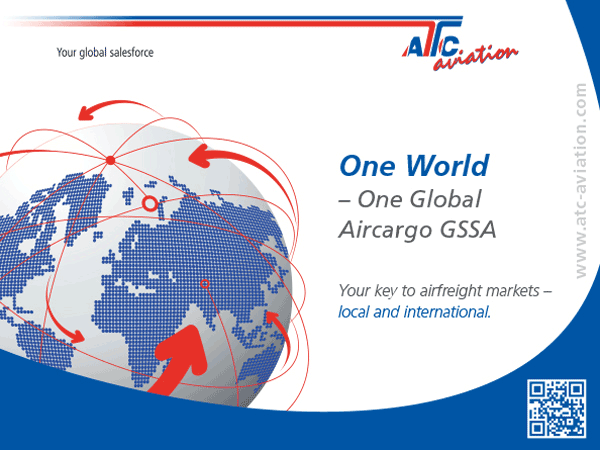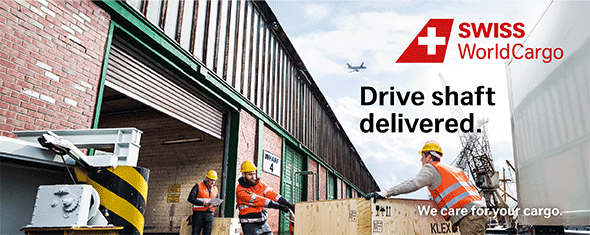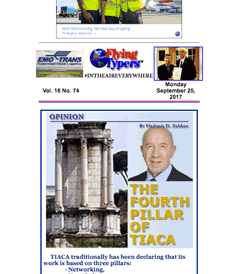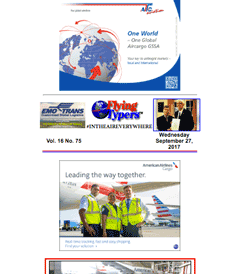 Doha
Exclusive—Qatar Airways Chief Cargo Officer
Ulrich (Uli) Ogiermann has enjoyed a varied and illustrious air cargo
career. In addition to his 5 years with Qatar Airways, Uli also served
as CEO at Cargolux and as Chairman of the International Air Cargo
Association (TIACA).
Doha
Exclusive—Qatar Airways Chief Cargo Officer
Ulrich (Uli) Ogiermann has enjoyed a varied and illustrious air cargo
career. In addition to his 5 years with Qatar Airways, Uli also served
as CEO at Cargolux and as Chairman of the International Air Cargo
Association (TIACA).
It is doubtful that anything this
decent, soft-spoken executive has done in his life has required more
skill than serving as Chief Cargo Officer at Qatar Airways. During
his tenure, a blockade served by several of Qatar’s Gulf neighbors
has impacted the carrier.
Here, Uli opens up about conducting
business under unusual circumstances, addressing a host of topics
in an exclusive, wide-ranging interview.
What is your message to customers in early
October?
“At this time
of unprecedented demand, we want our customers to know that we remain
long-sighted. We know that for every up-cycle this industry has, there
is a corresponding adjustment. We are in it for the long term,
and will not take advantage of present market conditions at the expense
of the lifetime value of our relationships. Customers and suppliers
get the best from each other when working in a spirit of collaboration.
Sadly we are seeing opportunism being practiced by some suppliers.
This can take many forms, such as a reversion to the old Fuel Surcharge
(FSC) mechanisms or worse still, a ‘peak season’ surcharge
to name just two. We will not work this way and customers should
not stand for it. Our pricing will remain simple and rational and
our relationships across the industry will always be the first consideration.”
How does the immediate business future look
to you?
“2017 has been
a very strong year for Qatar Airways and for the market, and Purchase
Manager Index (PMI) levels suggest that performance will continue
to be good for the rest of the year. The peak season should be a strong
one, in part due to increased demand and more modest capacity inputs
into the market, hence we expect performance to remain positive not
only for Qatar Airways Cargo, but for the industry as a whole.
“We recently received our first
nose loader B747-8F and thirteenth B777 freighter, both being significant
additions to our fleet in line with our fleet expansion strategy.
With the new arrival, we are able to offer our customers a young and
modern freighter fleet of 1 B747-8F, 13 B777Fs, and 8 Airbus A330Fs.
“We are expanding our network,
adding new destinations around the world with a strong focus on our
Doha hub and are also growing in flows without Doha stops like trade
between America and Europe. Of course, our trunk routes are still
very important, like Asia to Europe /Africa/Middle East and the way
back, as well as trade within the Middle East and South Asia.
“We will launch our sixty-first
freighter destination and the thirteenth freighter destination in
the Americas, Pittsburgh, on October 11, providing reliable and efficient
cargo connections to businesses across the Atlantic.
“The way goods are being shipped
to customers is changing thanks to e-commerce. This is definitely
driving our business, because we have such density and e-commerce
hubs in our network. High capacity to the major distribution hubs
such as Singapore, Bangkok, and Hong Kong enables us to accommodate
demand for short transit times. Our operating pattern on the passenger
and freighter side makes us a responsive partner to both forwarders
and postal authorities, which handle a large share of e-commerce goods.
Our fully automated hub is highly efficient and we have special processes
and teams in place to handle the most time-sensitive freight.”
What has it been like operating with a blockade
in 2017?
“Immediately
when the blockade was imposed, we were given the mandate to prioritize
the airlift of food supplies for the country. We quickly reinforced
our operations, flight schedules, and staff rosters to manage the
increased imports of food supplies and provide stability for the national
food distribution channels.
“With timely growth in our Hong
Kong freighter slot-portfolio (the single largest air cargo market
in the world), we moved quickly from 17 B777F flights per week to
21 flights. Along with this, we started upgrading capacity into
the key region of the Indian sub-continent and offered more charter
services to the commercial market, ensuring that we preserved our
overall share of the global air cargo market.
“At the same time, we witnessed
a surge in the demand for air cargo capacity for perishable goods
into Qatar from an average of 180 tons per day to 900 tons per day. Recognizing
the importance of preserving the integrity of our commercial schedule,
Qatar Airways Cargo quickly sourced a range of aircraft from 3rd party
providers comprising military C17s, B747Fs, A330F, A300Fs, and Ilyushin
aircraft, to fly dedicated charters bringing in supplies of fresh
milk, yoghurt, fruits, and vegetables.
“Our wide-body passenger flights
out of Australia and key Asian destinations such as Jakarta, Singapore,
Bangkok, and Denpasar, Bali, also provided sufficient capacity for
perishable exports to the State of Qatar. This has ensured uninterrupted
service.
“Since this time, structural
changes to Qatar’s supply chain have taken place. With
food inventory levels now fully restocked and the introduction of
two key maritime shipping routes from Asia and Oman, demand for air
cargo capacity has now returned to pre-crisis levels. While the majority
of the nation’s imported supplies now come by ship, we continue
to manage the national air cargo requirements using leased freighters,
leaving our global commercial operations running at full capacity.”
How did QR Cargo adjust to the sanctions?
What did you learn? What surprised you?
“The illegal
blockade imposed on the State of Qatar on June 5 did provide some
early challenges. However it has proven our resilience, not only for
Qatar Airways Cargo but also for the airline and the country. We reacted
swiftly to ensure minimum disruption to our schedule and services,
prioritizing our customers and the business and at the same time supporting
the massive airlift of food imports into Doha.
“During this period, we received
and handled an average of 15 freighters daily, in addition to our
normal capacity of cargo services to 60 destinations around the world.
Each of the freighters transported between 60 to 100 tons of relief
and food supplies such as dairy, vegetables, fruits, eggs, and fresh
meat.
“We handle an average of 150,000
tons of cargo that pass through Doha’s Hamad International Airport
each month. In the month of June 2017, we have seen a 160 percent
increase in cargo imports into Qatar, compared to June 2016.
“Managing such a precipitous
increase in imports fully stress-tested Qatar Airways Cargo’s
state-of-the-art investments, not just our USD 1 billion, 55,000-square
meter cargo facility that opened mid-2015, but also our two brand
new facilities which opened this summer—our dedicated Climate
Control Centre and Cargo Overflow structure, providing close to an
additional 10,000 square meters of temperature-controlled handling
space.
“Thankfully, we had planned well
ahead for future commercial growth. So these wise investments proved
more than capable of accommodating the extra demand, serving grateful
importers in record time and restocking the supermarket shelves with
ample supplies of fresh produce overnight.
“The blockade has proven that
Qatar Airways Cargo is a very robust and resilient business. We have
maintained our global air freight shares with pre-embargo customers
and our customers benefit from having access to a larger network and
greater flexibility. An interesting by-product of the illegal blockade
is that many plans have been expedited. Such was the case with Qatar’s
planned dairy industry, and QR Cargo’s role in bringing it about.
“Qatar has been actively investing
in the agriculture and food sector through Hassad Food, Qatar’s
premier investor in food and agri-business sectors. This is in line
with Qatar’s National Vision 2030, food security goals, which
are to increase the quality and quantity of crop production. As a
key partner in the Nation’s food security strategy, we have
been appointed to transport 4,000 Holstein cows to facilitate the
newest industry to be developed in the State of Qatar, a dairy industry.
“We have begun these livestock
shipments on board more than 20 B777 charter freighters to Doha. This
is the first time that Qatar has experienced an airlift of this magnitude
to support the establishment of a new industry.”
How have customers reacted during the blockade?
“We are truly
humbled by the pledges of support from across our customer base and
are thankful to them for standing by us in turbulent times. We attribute
this loyalty not just to the effectiveness of our response, but also
to the contrasting approaches to pricing which took place immediately
after the blockade was announced. Qatar Airways Cargo chose not
to exploit our greater share of Doha capacity. However, customers
are reporting that there are carriers serving other markets, who are
using the embargo as an opportunity to increase prices.”
Taking an industry view, where does the average
shipper still require education?
“We all know
that air cargo capacity is the most expensive mode of transport.
This means that spillage and spoilage come at a high cost for the
entire supply chain. Professional air cargo carriers have made
big investments in technology and can now predict inventory levels
extremely accurately, but where we fall down as an industry is in
predicting demand. Upstream investments in forecasting would
pay dividends to all participants in the supply chain. I do not
point my finger at any one player, but instead would urge all parties
to work together to achieve these efficiencies.”
Why are air freight forwarders important
to Qatar Cargo? Why should a forwarder trust that QR will be a good
partner?
“Through understanding
our customers’ needs and tailoring our offering to exceed expectations,
we have built our brand and business on a high level of customer satisfaction
to achieve growth. Every shipment entrusted to us is handled with
great care from point of origin all the way through to the final destination.
We have efficient and effective measures in place for the safe and
secure storage and transportation of all kinds of cargo and are investing
considerably in our products, fleet, facilities, and services to meet
challenges and address our customers’ expectations.
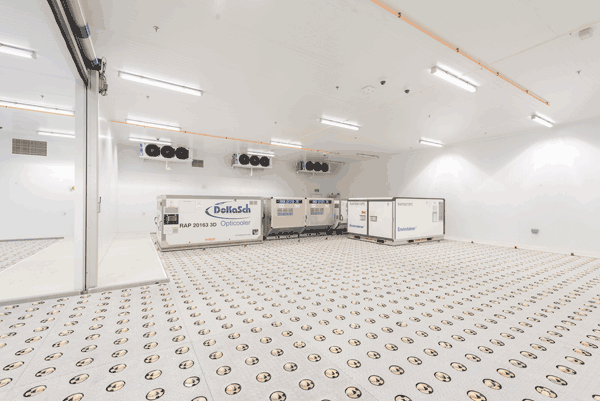 |
“Take for example the investment
into the state-of-the-art Climate Control Centre at Hamad International
Airport that opened this year for pharmaceuticals. This GDP compliant
2,470-square meter, temperature-controlled center is situated airside
and enables us to handle an additional 2 million tons throughput per
annum. Another major investment is the second cargo terminal that
is being built to cope with future demand and growth and will increase
our annual cargo capacity from 1.4 million tons to 4.6 million tons
when it opens in few years.
“Since the air cargo industry
serves as a key engine of economic growth and development supporting
trade and investment, improving connectivity, and promoting efficiency
and competitiveness, the airline has been heavily investing in technology
and innovation, simplifying business processes for the benefit of
our customers.
“We lay emphasis on achieving
consistency of handling in terms of safety, security, quality, and
operational delivery not only at our hub, but also at destinations
throughout our network. We set high standards for these disciplines
and the capabilities of our ground handling agents are rigorously
assessed with each new route launch or expiry of handling contract
at existing stations.
“Every customer is important
to Qatar Airways Cargo and we value the relationship with our clients.”
On a global basis, are certain regions more
competitive than others?
“Open skies
are good for the consumer. At Qatar Airways, we don’t
believe in borders. Opening the world up to trade and travel brings
consumers and producers closer together, and it creates wealth and
increases standards of living. In the end, a protectionist agenda
only serves to stifle trade and separate people.”
What is cargo’s contribution to total revenues? Why
are you bullish moving ahead?
“Qatar Airways
Cargo is an important revenue generator, contributing between 20-25
percent to the overall revenue of the airline. The high frequency
of our passenger flights with belly-hold capacity makes it even more
possible for us to sell highly profitable products such as express
freight or pharmaceuticals transport services.
“The freight division’s
performance has been improving year on year. Our estimated tonnage
for 2016 was over 1.1 million tons, a 21 percent increase over the
previous year. 2017 started with strong demand for both air and sea
freight. We have seen good demand across the world despite capacity
crunches in some markets. Current purchasing indications signify a
positive outlook in the next few months. In general, 2017 should be
a year of growth for air freight, although the total growth result
will rely on our sales performance during the coming peak season.
“We have witnessed an increase
in the tonnage of various products flown each year, with express products
at 30 percent increase in 2016-17 over 2015-16, perishables at 17
percent, live animals at 74 percent, and pharmaceuticals at 39 percent.
Our charter business has also performed outstandingly well, where
tonnages via charter freighters alone rose by 155 percent in financial
year 2016-17 compared to 2015-16.”
Note: Express
is the mix of Express, Gold, Platinum and Courier shipments
Data source: QR’s Agents Sales
Data and MIS system.
“IATA’s released data for
global air freight markets proves that demand growth continues to
significantly outstrip capacity growth, a key factor that influences
the yields positively. FTKs showing that demand grew by 10.4 percent
in the first half of 2017 compared to the first half of 2016 while
AFTKs grew by 3.6 percent in the first half of 2017 compared to the
first half of 2016.”
Why are you confident about Qatar Cargo?
“Thanks to Qatar Airways Cargo’s
professionalism, our investments in ground-based infrastructure and
our long-term attitude toward our customers, we continue to see major
gains in our overall market share. Qatar Airways Cargo is the only
Middle East carrier to grow market share in 2017 while both our competitors
in the region have seen material declines**. 2017 is proving
to be another high for Qatar Airways Cargo—we are seeing record
volumes, revenues, yields, and market shares.”
“We will continue to expand our
cargo network and fleet in 2017 as we are optimistic about the growing
air cargo traffic globally, especially where the emerging economies
and production hubs are. We are ready to take on a significant increase
of demand in the remainder of this year.
“Underscoring the confidence
in our industry position, we are investing in our network and fleet
expansion along with a multi-billion dollar investment in a second
cargo hub in Doha, which will more than triple our handling capacity.”
**Based on IATA’s Carrier Tracker in International FTKs
for 2016 vs. YTD 2017.
What is QR’s commitment not only to
air cargo, but also to the earth?
“As one of the
leading carriers, we take our responsible business practices very
seriously and are committed to demonstrating environmental leadership.
Qatar Airways Cargo along with the airline is committed to complying
with all local and international environmental regulations. Our corporate
sustainability strategy and policy is under constant review to make
sure we are up to date with any new issues as they arise. Our group
Environmental Affairs department leads this effort with input and
support from Qatar Airways Cargo senior management in terms of logistics
and specific cargo industry requirements.
“The airline has already achieved
IATA’s Environmental Assessment (IEnvA) accreditation at foundation
level and has begun implementing additional environmental management
system procedures to attain full certification to IEnvA stage 2.
“Our focus remains on optimizing
environmental performance across our young and modern fleet and throughout
our state-of-the-art hub, Hamad International Airport. Fuel and energy
efficiency, minimizing waste and preventing pollution, and transportation
of endangered species are the priorities for the airline. Qatar Airways
is an inaugural signatory to the United for Wildlife Transport Industry
Declaration.
“The industry is moving towards
cargo XML, e-air waybills, and online booking systems. One of the
key success factors here is IT infrastructure. At Qatar Airways Cargo,
we have made immense progress on this front and over 75 percent of
our shipments on Qatar Airways are transported using e-AWB. Apart
from simplifying the air cargo process and enhancing business efficiency
and sustainability, a major benefit is the reduction of carbon footprint.”
Geoffrey
